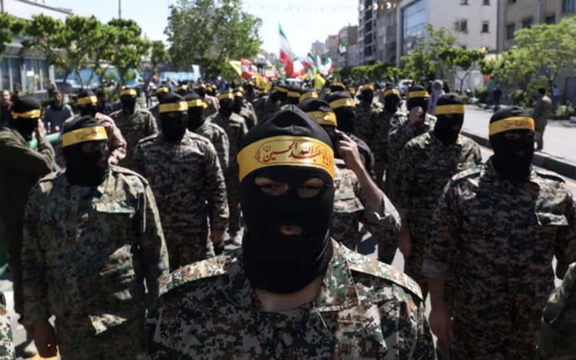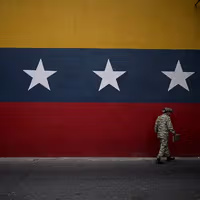World Markets Jittery Over Israel-Iran Tensions
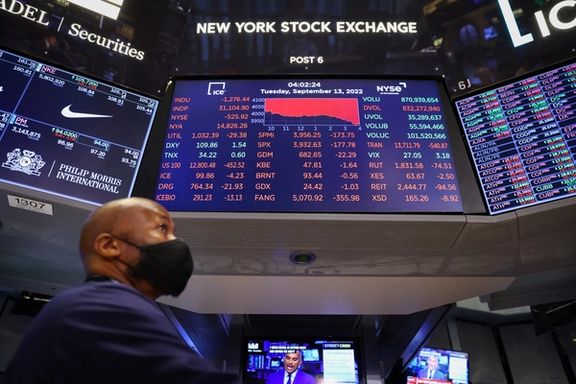
World markets faced turbulence on Friday as tensions rose between Iran and Israel following a strike earlier in the week that killed seven IRGC personnel in the Iranian embassy in Syria.

World markets faced turbulence on Friday as tensions rose between Iran and Israel following a strike earlier in the week that killed seven IRGC personnel in the Iranian embassy in Syria.
Iran has vowed retaliation against Israel, creating more tensions in a region already experiencing six months of war in Gaza and a ‘sitting war’ between Israel and Iran’s chief proxy, the Lebanese Hezbollah. Prime Minister Benjamin Netanyahu said Thursday his country would harm "whoever harms us or plans to harm us".
Shares retreated late on Thursday and in early trading on Friday amid warnings of a possible retaliatory attack by Iran and further military response by Israel. Oil prices also remained high, as the threat of supply disruptions in case of a prolonged conflict in the Middle East kept Brent futures above $90 a barrel, a level not seen since last October.
US futures were all lower partly reacting to Middle East tensions and also ahead of US job data to be announced on Friday.
Rodrigo Cartil, a forex strategist at National Australia Bank told Reuters, "There is a little bit of edginess in the air not helped by a spike in oil prices amid an increase in Israel-Iran tensions.” He added that, "The risk of escalation in the Middle East conflict is rising."
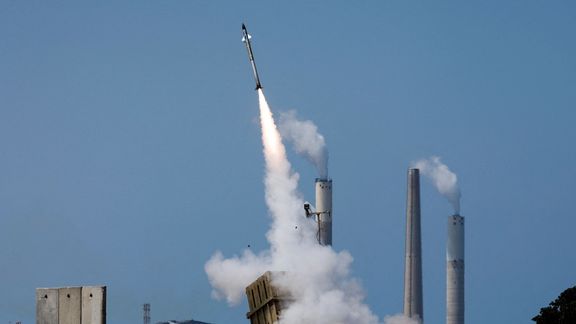
Concerns regarding a potential Iranian attack on Israel reached their peak on Thursday, the eve of the last Friday of Ramadan, which Tehran has designated as Quds Day in solidarity with Palestinians.
Late Thursday, Axios reported that Israel has gathered intelligence that shows Iran could attack Israel from its soil using long-range ballistic missiles, cruise missiles or drones”. Axios also cited an Israeli source about a phone call between Israeli and American defense ministers.
In his cabinet meeting Thursday, Netanyahu warned Iran that Israel would “harm” anyone who wants to harm it. "For years, Iran has been acting against us both directly and via its proxies,” he said, “Israel is acting against Iran and its proxies, defensively and offensively."
The term ‘Quds Day’ was first coined in Iran immediately after the 1979 Revolution. It gained significance after Ruhollah Khomeini, the leader of that revolution –and the founder of Iran’s Islamic Republic– called on Muslims everywhere to mark the day by pro-Palestinian rallies and protests against Israel.
Quds Day and the fasting month of Ramadan has often seen a heightened tension in Israel and the Palestinian Occupied Territories, but this year the stakes are much higher because of October 7th and the ensuing Israeli onslaught on Gaza, which has drawn the world’s attention to the decades-long tragedy like never before.
“This year’s Quds Day will be a global uproar against the usurping Zionist regime,” Iran’s leader Ali Khamenei said this week. “In previous years, Quds Day [rallies] were held only in Islamic countries. But this year, it’s highly likely that Quds Day [rallies] are organized in non-Islamic countries as well, with glory, God willing.”
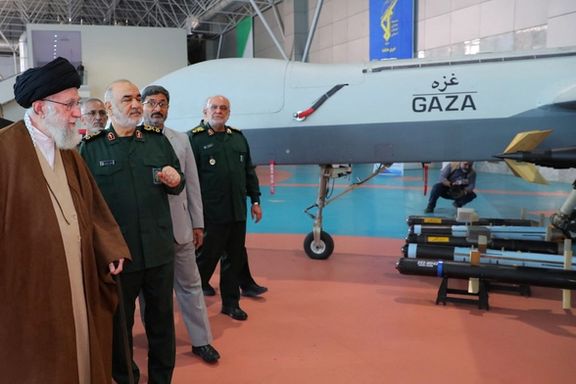
Israeli officials had raised concerns about potential attacks by Iran, Hamas, and Hezbollah before Ramadan began. Defense minister Yoav Gallant had predicted attempts to turn the holy Muslim month into the “second phase” of what happened on October 7th and "inflame the region."
Four days to the end of Ramadan, the “second phase” Gallant warned about seems to have not materialized. But the fear of a Middle East in “flames” is still very much alive, even more so since April 1 when Israel killed seven members of Iran’s Revolutionary Guards, including two high-ranking commanders, in an unprecedented airstrike on Iran’s consulate in Damascus.
Most Iranian officials immediately threatened to retaliate. There were also some inside Iran who called for a “measured response” to avoid escalation. Khamenei spoke of “punishment” for Israel. “We will make them regret this crime and other ones like it,” he said one day after the airstrike on Iran’s consulate.
Shortly after, reports began circulating in Israeli media about the possibility of retaliatory attack by Iran or its proxies, raising fears among the public and putting the Israeli army on high alert.
US officials said they had not picked up intelligence suggesting Iran-backed groups were looking to target US troops following Monday's attack.
Nonetheless some experts and insiders –such as Amos Yadlin, a former Israeli intelligence chief– warned that Iran might choose Quds Day (Friday 5 April) to respond to the strike on its consulate in Syria, either directly or through a proxy.
Until now, Iran has somehow avoided direct confrontations with Israel and the US. But on Thursday, Reuters quoted a US official, speaking on condition of anonymity, that many fear “Iran would make good on its threats to retaliate, raising the risk of volatile, regional escalation.”
But many experts believe that Tehran is not as interested, as it shows it is, in a full-blown war with Israel –and potentially the US– not least because a costly war could further destabilize the country and mark the beginning of the end of the Islamic Republic.
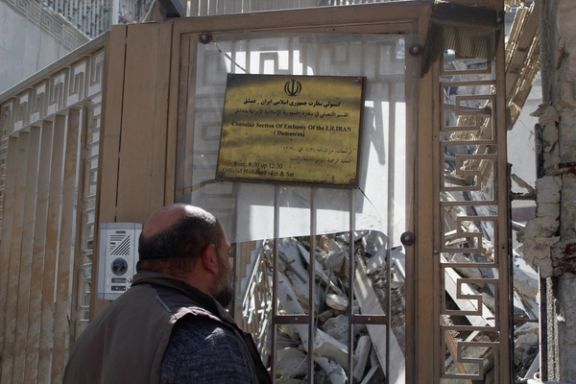
A member of Iran's National Security Commission claims this week's Israeli attack on Iran’s consulate in Damascus violates the Vienna Convention.
Abbas Golrou went on to warn that Iran “would not be constrained by any boundaries or red lines” in its response to the incident.
The attack, which occurred on Monday, resulted in the deaths of two Revolutionary Guard generals and five other IRGC officers. The attack followed a significant Israeli air strike inside Syria the previous week, claiming the lives of over 40, predominantly Syrian soldiers and Hezbollah militants.
Khaled Khiari, Assistant Secretary-General for Middle East, Asia and the Pacific in the Departments of Political and Peacebuilding Affairs and Peace Operations for the United Nations, said after the attack, “The rules-based international order is essential for international peace and security, which this Council is mandated to maintain,” said in his briefing to the UN Security Council after the attack.
The UN did not blame Israel directly other than referring to the attack as "reported Israeli attacks", but warned, “Any miscalculation could lead to broader conflict in an already volatile region, with devastating consequences for civilians who are already seeing unprecedented suffering in Syria, Lebanon, the Occupied Palestinian Territory, and the broader Middle East".
In the briefing, delegations such as Russia and China, key allies of Iran and fellow pariah states, voiced concerns that any attack on diplomatic and consular premises violates the Charter of the United Nations as well as the 1961 Vienna Convention on Diplomatic Relations and the 1963 Vienna Convention on Consular Relations.
The Monday airstrike was by all accounts an unprecedented escalation of the shadow war between Iran and Israel which has escalated in the wake of Iran-backed Hamas's invasion of Israel on October 7. Israel has on many occasions hit IRGC-related targets in Syria, but never before a diplomatic site, though experts such as Ronen Solomon from Intellitimes claim the complex was in fact a military complex for the IRGC.
Sources have speculated that the attack on Iran’s consulate was a retaliatory measure for a drone strike on Israel the night before, targeting a naval base in Eilat. A spokesman for the Israeli army said the drone was “made in Iran” and the attack was “directed by Iran.”
Despite the ongoing tensions in the region, Iran has refrained from direct confrontation with Israel, particularly amid the six-month conflict involving Iran-backed groups in Gaza, preferring to trigger its proxies to attack Israel from Lebanon, Yemen, Iraq and Syria.
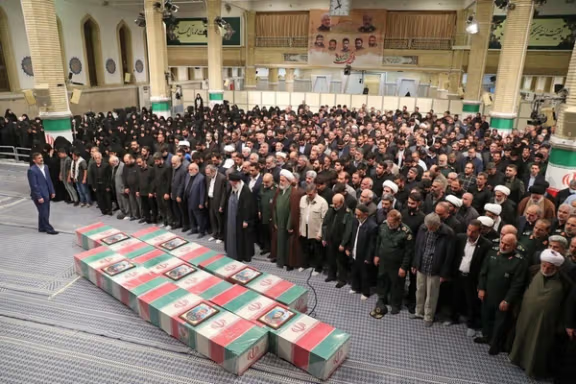
The Financial Times reported that suspected Israeli strikes have claimed the lives of 18 IRGC commanders and advisers since the Gaza war broke out on October 7.
According to the report, all of the slain IRGC forces were targeted in Syria, with 16 in Damascus, one in Deir ez-Zor and one in Baniyas.
Since the Gaza war broke out, Iran’s proxies have attacked Israel from Lebanon, Syria, Iraq and Yemen, and attacked US targets in the region as punishment for the US backing of Israel’s right to defend itself in the wake of October 7. In the most deadly day for Jews since the holocaust, over 1,200 mostly civilians were murdered and over 250 taken hostage.
Israel’s Monday attacks against Iran's consulate building in Damascus have been the deadliest since the inception of the ongoing conflict in the region, killing seven IRGC forces, including two top commanders.
The most prominent figure killed in the recent attacks was Mohammad Reza Zahedi, the highest-ranking commander of the Iranian Revolutionary Guards Quds Force (IRGC-QF) in Lebanon and Syria. Qods Force is the IRGC’s overseas branch coordinating proxy activities.
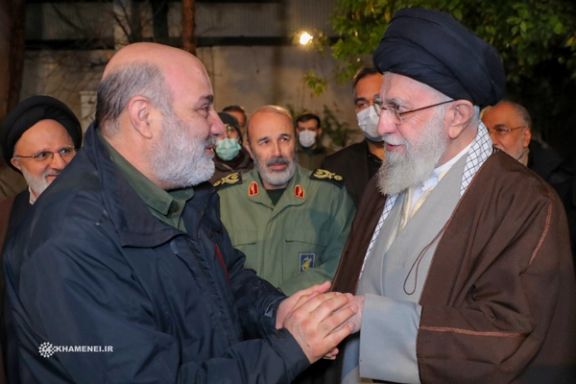
Zahedi, 63, joined the basij militias as a teenager and became involved in suppressing protesters. He was a mid-level commander during the Iran-Iraq war and was known by the pseudonym Ali Zahedi. In the mid-2000s, he went to Lebanon where he quickly established a strong network within Hezbollah, to the point he became “the only non-Lebanese member of the group’s council,” Amwaj Media reported.
Zahedi was appointed by Supreme Leader Ali Khamenei as the commander of the IRGC ground forces in 2006. He was later transferred to the IRGC Qods Force. According to his son, Zahedi had not returned to Iran since the start of the Gaza war, sparked by Iran-backed Hamas’s invasion of Israel, and only recently spent a few days in the country on the occasion of Nowruz, Iranian New Year.
The second most important person killed in Israel’s Monday strike was Zahedi’s deputy Mohammadhadi Haji Rahimi. Iranian media have called him the deputy coordinator of the IRGC Qods Force. According to reports, he had been a member of the Quds Force since it was formed and was one of its first commanders. Like Zahedi, Haji Rahimi was also a veteran of the Iran-Iraq war and participated in other regional wars in which Iran was involved in some way.
Hossein Amanollahi, Mehdi Jalalati, Mohsen Sedaghat, Ali Agha-Babaei, and Ali Salehi Rouzbahani were the other five members of the IRGC Quds Force who lost their lives in Israel’s Monday strikes.
In the past few months, two other high-ranking IRGC commanders were killed in suspected Israeli attacks in Syria: Razi Moussavi and Hojjatollah Omidvar.
Razi Mousavi (aka Seyyed Razi) was targeted by a direct airstrike on December 25. He headed IRGC’s ‘logistics’ and military coordination in Syria, getting weapons for and coordinating Iran-backed forces in Syria and Lebanon.
On January 20, a building in Damascus’s Mazzeh neighborhood was struck in an attack which claimed the life of Hojjatollah Omidvar (also known as Hajj Sadegh), a senior IRGC commander. He served as the deputy intelligence chief of Qods Force in Syria. Four other IRGC officers were also killed in the strike: Ali Aghazadeh, Saeed Karimi, Mohammad Amin Samadi and Hossein Mohammadi.
Among other IRGC victims of the alleged Israeli attacks are Behrouz Vahedi (targeted in Deir ez-Zor, March 26), Reza Zarei (targeted in Baniyas, March 1), Saeed Alidadi (targeted in south of Damascus, February 2), and Mohammadali Ataei Shourcheh and Panah Taghizadeh (both targeted in Damascus, December 2). The Iranian media have described them as “military advisers.”
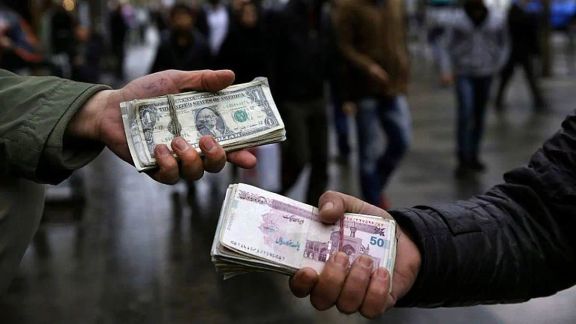
On Thursday, Iran's national currency experienced another plunge to an unprecedented low with the US dollar trading at 646,000 rials following this week's Israeli airstrike on Iran's consulate in Damascus.
It marks the highest recorded exchange rate for the American currency in Iran and represents an over 25 percent drop since early January. The Euro was also traded at 701,500 rials, while the British pound hovered near 818,000 rials, reflecting the economic turmoil within the country.
The airstrike this week resulted in the deaths of two high-ranking IRGC commanders and five officers, sparking vows of retaliation from the Iranian regime.
Abdolnasser Hemmati, the ex-chief of the Central Bank, voiced criticism against President Ebrahim Raisi's economic policy amid the crisis, stating, "Despite numerous assurances, the pricing trends of essential items and assets are taking an intolerable course. The public's perception of unfolding events... validates the economic neglect. Even among its proponents, doubts are arising regarding the government's effectiveness and management!"
The decline of the rial has been a long-standing trend since the 1979 revolution, but it notably accelerated in 2018 following the US withdrawal from the JCPOA nuclear deal and the subsequent imposition of sanctions on Iran's oil exports and banking sector. Remarkably, the currency was valued at 70 rials per dollar in 1978.
The sharp devaluation of the rial has exacerbated inflationary pressures over the past five years, pushing millions of Iranians below the poverty line. Official government statistics indicate an annual inflation rate of over 40 percent, though many experts believe the actual figure to be higher.
Iranian authorities have consistently displayed ambivalence towards the impact of international measures on the nation's economy. While attributing any shortcomings to the actions of the US and its allies, they simultaneously assert that these punitive measures lack substantial efficacy, further complicating the economic landscape within Iran.
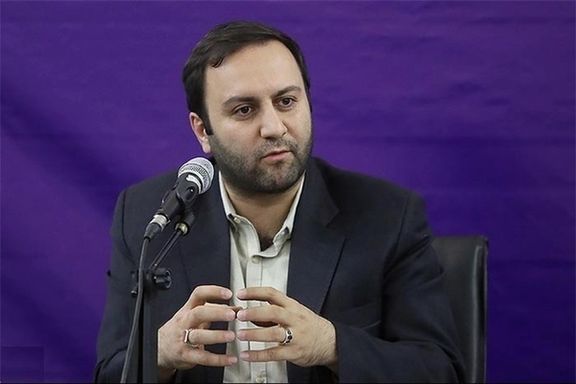
Iranian Member of Parliament Mohsen Pirhadi rejected the notion that Israel's recent attack on the Iranian embassy in Damascus constituted an assault on Iranian territory.
In an interview with Rouydad 24, Pirhadi emphasized that interpreting the attack in such a manner is not accurate, stating, "The Zionist regime's action is a heinous act and a violation of international law principles, but it should not be equated with an attack on our Iranian soil."
The airstrike on Monday targeted the Iranian embassy building in Damascus. The airstrike resulted in the deaths of seven Revolutionary Guards, including two senior commanders.
"Given the importance of the issue, the MPs will definitely delve into the details of the terrorist act and the plans of relevant agencies for how to respond to the crime and defend the country's security in the first session of the parliament after the end of the Norouz holidays," stated Pirhadi.
Despite tensions and conflicts in the region, Iran has refrained from direct engagement with Israel, particularly amid the six-month conflict involving Iran-backed groups in Gaza.
Pirhadi’s comments come as IRGC General Esmail Kowsari, a member of the Iranian parliament, asserted on Wednesday that Israel's attack on Iran's consulate in Damascus constitutes an encroachment upon Iranian territory, demanding a robust response from Iran. He dismissed the concept of "strategic patience" in the face of such incidents, affirming that Iran will promptly retaliate against Israel.
Kowsari further stressed that the United States should anticipate Iran's retaliatory measures, cautioning Israel against further attacks on Iran's interests.
